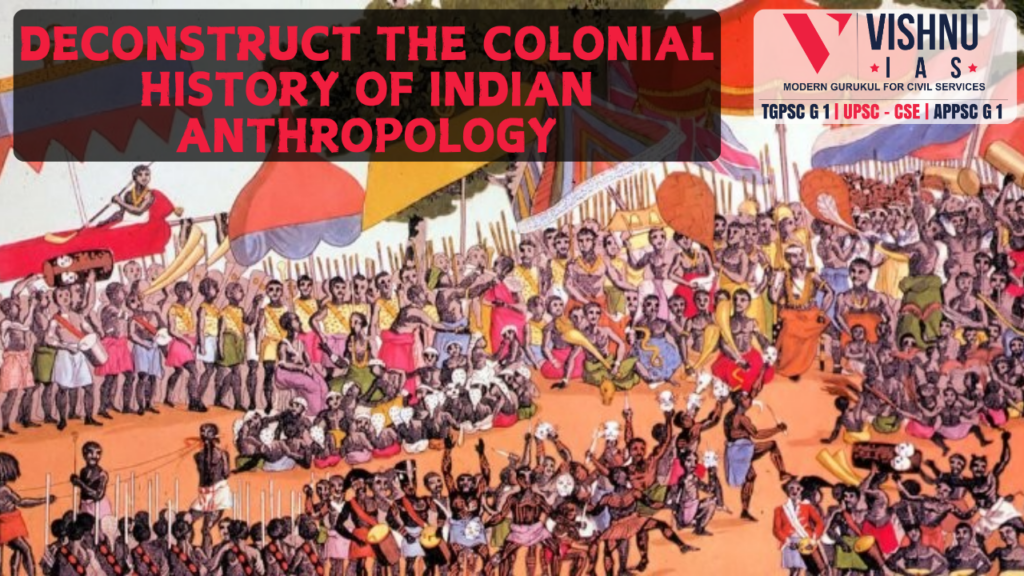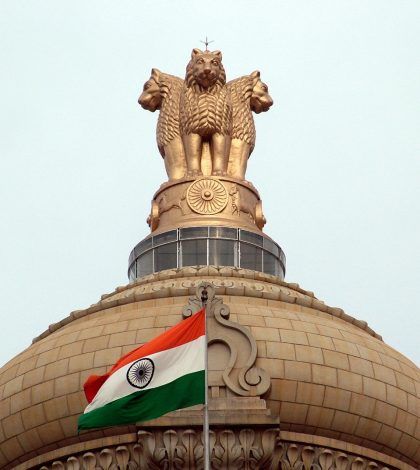Deconstruct the colonial history of Indian Anthropology highlighting the critical role played by the Indian Anthropologists in sustaining its autonomy.
Approach
- Introduction: Few points regarding colonial history of Indian Anthropology
- Body: Analysis of highlighting the critical role played by the Indian Anthropologists in sustaining its autonomy.
- Conclusion: add its contemporary relevance
INTRODUCTION
Indian anthropology, like many academic disciplines in colonized regions, began under the influence of European scholars and administrators. During the British colonial period, anthropology was primarily used as a tool for governance and control. Colonial anthropologists focused on documenting the diverse cultures, castes, and tribes of India, often through a lens that reinforced colonial stereotypes and hierarchies.
BODY
Colonial History of Indian Anthropology
Nationalist and Post-Colonial Shifts
Despite its colonial origins, Indian anthropology began to evolve significantly during the nationalist movement and after independence. Indian anthropologists started to challenge the colonial narratives and sought to develop a more autonomous and indigenous perspective on the study of their own societies.
Role of Indian Anthropologists in Sustaining Autonomy
Key Contributions
- Surajit Sinha:A prominent figure in Indian anthropology, Sinha emphasized the importance of integrating traditional knowledge systems with modern anthropological methods. His work helped to bridge the gap between colonial anthropology and a more indigenous approach.
- Nirmal Kumar Bose: Bose was instrumental in promoting the idea of anthropology as a tool for national development. He advocated for the use of anthropological insights in policy-making and development programs, thereby ensuring that the discipline remained relevant and autonomous.
Institutional Support
- Anthropological Survey of India (ASI):Established in 1945, the ASI played a pivotal role in promoting indigenous research and supporting Indian anthropologists. It provided a platform for Indian scholars to conduct fieldwork and publish their findings, thereby reducing dependence on Western academic institutions.
- Indian Anthropological Association (IAA):The IAA has been instrumental in fostering a community of Indian anthropologists and promoting research that is relevant to the Indian context. It has also facilitated international collaborations, helping to position Indian anthropology within the global academic community.
Challenges and Achievements
Indian anthropologists have faced numerous challenges, including limited funding, political pressures, and the need to balance traditional knowledge with modern scientific methods. Despite these obstacles, they have made significant contributions to the field, ensuring that Indian anthropology remains a vibrant and autonomous discipline.
CONCLUSION
The journey of Indian anthropology from its colonial roots to its current autonomous state is a testament to the resilience and dedication of Indian anthropologists. By challenging colonial narratives and advocating for indigenous perspectives, they have ensured that the discipline remains relevant and reflective of India’s diverse cultural heritage.
Anthropology Full Course at Vishnu IAS Academy
What does Course Offer?
- 4 Months (250+ Class Hours)
- Online (App + Web) / Offline / Hybrid Mode of Classes
- Live + Recorded Videos Access For 1 Year
- 2 Hour Live Class From Monday to Saturday (1.5 Hours for Class + ½ Hour for Doubt Solving)
- Foundation to Advanced Level of Teaching
- Simple and Integrated Content
- One Stop Solution Books
- Regular Value Added Content
- Current Affairs & Case Studies Modules
- Daily Answer Writing Practice
- Weekly Grand Tests On Sundays & Evaluation With Guidance and Topper Will be Rewarded
- 500+ Model Answers
- 9 AM – 9 PM Support System
- Free GS Current Affairs
- Free Interview Guidance for Anthropology


